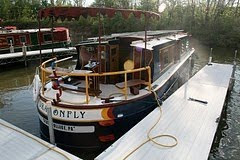 |
| Check your charts: This bit of real estate is called Artificial Island. Really! |
Early Monday, we were coasting down Delaware Bay with blue skies overhead but deep fog all around. And our tour of eastern nuclear plants continued! The cloud of steam from the Salem Nuclear Plant bulged above the rim of fog.
The Salem complex includes two nuclear reactors. Another reactor is being considered. About 5.5 million people live within 50 miles of this facility. (Did you notice that some experts are recommending evacuation within a 50-mile radius of the Japanese plants?)
These reactors were shut down for a while in the 1990s because of maintenance problems. And they were shut down twice this past week, for the same problem: bits of plant matter floating in the Delaware River clogged the cooling water intakes. (Officials call the problem "grassing.")
I wrote earlier this week about the importance of seagrass in the Chesapeake Bay. As far as I can tell, the problem at Salem is NOT with native seagrasses, which grow underwater. The problem is phragmites--a tall marsh grass. Non-native varieties of the grass, brought here by European settlers, are crowding out other native grasses and taking over many northeastern marshes. In spring, stems of last year's phragmites are dry and yellow. Wind and rain break the grass down, and you see mats of the stuff floating in the water.
The irony seems to be on multiple levels. First, consider that nature is trashing a masterpiece of human engineering--without even trying. The decay of marsh grass in spring is a natural, perennial process. It's hardly a rare and catastrophic upheaval, like a tsunami.
But how "natural" is this grass? Experts think that some of the phragmites growing around here is a strain introduced--probably accidentally--from Europe. Non-native species usually have no predators in their new home, so they grow out of control and wreck ecosystems. Crowd out the native plants.
And then ducks and fish and other critters that rely on the natives go hungry.
But whoda thunk an invasive species could shut down a nuclear plant?
You just can't predict WHAT will happen when you mess with Mother Nature.
Bizzare Wikipedia factoid: Bruce Willis once worked at the Salem Nuclear Plant--as a security guard. Maybe he can star in the major motion picture, based on the situation in Japan, that Hollywood will doubtless soon produce.





Well you could sort of be a mix of the best of PBS (talks about alternative energy and invasive species) and Bravo (Real Housewives of the Great Dismal Swamp?).
ReplyDelete